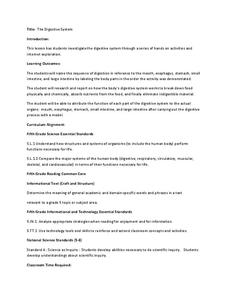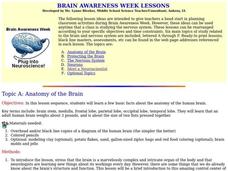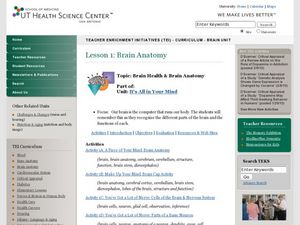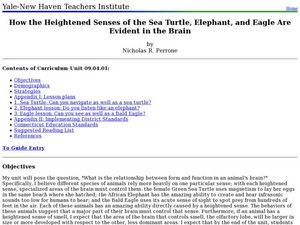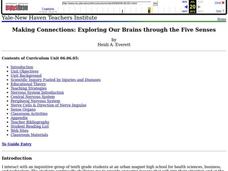University of Minnesota
Ways of Knowing: Apples as Models
Use apples as a way of thinking about models. Young scientists consider how the word apple, a two-dimensional drawing, a three-dimensional image, a photograph, and plastic apples all model real apples in preparation for developing models...
Curated OER
Nervous System
Get to know the body's central nervous system through an engaging game of nervous system telephone. But this isn't your average game of telephone. Here, pupils must find a way to communicate a message to the brain without speaking....
Curated OER
The Digestive System
Discover how the human body's digestive system works with a brain and stomach friendly activity. Scholars taste test a variety of foods to find out how they behave once in the mouth. Class members then play a game called Move That...
Curated OER
Brain Awareness Week
Students explore human anatomy by completing a list of activities over five days. In this brain science lessons, students examine images of brains and identify the different parts. Students complete an in-class quiz regarding brain...
Curated OER
Mind Over Matter: How Does the Brain Work
High schoolers research previous attempts by scientists to discover the ways in which the brain works, design and conduct an experiment to illustrate current research and present their findings to the class.
Curated OER
Brain Manipulative Model
Students visualize the major human brain divisions by using a manipulative puzzle to discover the names and functions of the regions. They use this hands-on anatomy aid to study the braqin regions.
Curated OER
Brain Awareness Week
Students explore the brain. For this science lesson, students create a model of the brain and discuss steps taken in order to protect the brain. Students design a container that would protect the brain from injury. Students discuss the...
University of Minnesota
Homeostasis of Thermoregulation
Whether you're battling the flu or trying to warm up on a chilly day, your body's ability to react to temperature change is fascinating! Anatomy scholars discover the fantastic feedback loops that control body temperature in a rigorous...
Curated OER
Brain Anatomy
Students explore the brain. In this brain anatomy instructional activity, students explore the brain, identify the parts and neurons. They identify nerve pathways involved in daily activities.
Curated OER
How the Heightened Senses of the Sea Turtle, Elephant, and Eagle Are Evident in the Brain
Students explore the senses of different animals. In this biology lesson plan students will study the animals selected for their grades. The students will learn about the brain and how the senses of that animal have developed.
Curated OER
The Human Body: A Life-Size Model On Paper
Students create a life-size paper model of the human body. They identify the major organs and state their fuction. They complete a quiz to end the lesson.
Curated OER
Making Connections: Exploring Our Brains through the Five Senses
Students identify structures of the brain, and neurons and analyze their functions. For this nervous system lesson students create drawings and models of anatomy.
Curated OER
Bird Brained?
Learners identify general abilities that indicate animal cognitive intelligence. In this biology activity, students create an intelligence testing challenge for ravens. They compare its ability to that of a crow.
Curated OER
Making and Using a Gel Person to Teach Human Anatomy
Students investigate organs, anatomical planes and transverse sections of the human body using gel people. In this human anatomy lesson plan, students use gel molds, gel and food items to make models of the human body. They create a...
Curated OER
Human Body Simon Says
Students display their new knowledge of human body parts' names and locations, by playing an adaptation of the game Simon Says. A more sophisticated version of the game can be played with older students as they learn more specific names...
Bridge
Mercury - Mercury is Rising
Hold a discussion in your class about the increase in mercury being found in fish that are caught commercially as food for humans. Given a worksheet, learners then calculate how much fish a person can safely eat each month to remain...
Curated OER
The Nervous System
Students investigate the nervous system. In this anatomy instructional activity, students identify and define vocabulary related to the nervous system. Students role play the parts of a nervous system and perform an experiment...
Curated OER
Coping with Changes
Learners build on knowledge of brain and nervous system in order to write about how their nervous systems help them cope with change in environment. Students navigate online sites to explore different parts of brain and nervous system.
Baylor College
Drugs, Risks and the Nervous System
In cooperative groups, middle schoolers contemplate the probability of 18 different situations occurring. After they make predictions, they compare them to the actual risk factors. This eye-opening exercise demonstrates that the odds of...
Baylor College
What Is a Neuron?
Your class won't get on your nerves while doing this modeling activity! After teaching the structure and function of a neuron using the included diagrams, give individuals some clay and chenille stems so that they can make their own...
Curated OER
Scatter-Brained
Seventh graders graph ordered pairs on a coordinate plane. They create a scatterplot. Additionally, they determine the line of best fit and investigate the slope of the line. Multiple resources are provided. An excellent resource!
Scholastic
Study Jams! The Senses: Seeing
What will viewers see when they watch this video about vision? They will observe RJ and Sam hanging out during a power outage with Rookie, the dog. The boys discuss the structure of the eye (pupil, iris, cornea, lens, retina,...
Curated OER
The Nervous System Lesson
Students identify features of the nervous system. They explore the needs of the human body by explaining the importance of good health in relationship to the body and explain the functions and care of the human body and its organs.
Curated OER
The Human Organism
Learners identify their feelings and learn constructive ways of handling conflict. In this feelings and conflict lesson, students read a story about conflict and identify ways to understand emotions and resolve conflict.




